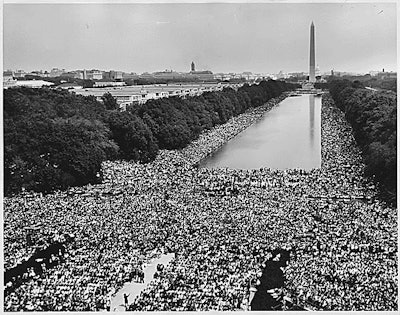
His name may not come up as often as other prominent figures of the civil rights movement—but trailblazing activist Bayard Rustin was instrumental in planning some of the most important and influential events in American history.
 Activist Bayard Rustin, pictured in 1963Photo: Warren K. Leffler, 1963 (LOC)
Activist Bayard Rustin, pictured in 1963Photo: Warren K. Leffler, 1963 (LOC)
That’s not the only history-making event Rustin had his hands in. As early as 1947, he was helping plan the first freedom rides for racial integration, and in 1955, he traveled to Montgomery, Ala., to help local leaders organize a large-scale bus boycott. And in 1957, he helped conceive of and organize the Southern Christian Leadership Conference, which catapulted Dr. King to the national stage and continues to be influential to this day.
Rustin, who frequently studied the works of Mahatma Gandhi, was known for his focus on non-violence as a tool for mass movement and grassroots action. Born in 1912 to a Quaker family in West Chester, Pa., Rustin was also an openly gay man—which at the time was seen as a political liability, keeping him in more of a background role. He died in 1987 and was posthumously awarded the Presidential Medal of Freedom by President Barack Obama in 2013.
Rustin's life and career offer a wealth of inspiration for today's event organizers, notes William P. Miller, the owner of W.P. Miller Special Events and co-founder of The Black Table, a collective that elevates Black-owned event businesses. In honor of Black History Month, BizBash caught up with Miller to discuss how Rustin has inspired his own career—and why he calls him "the greatest event planner of all time."
Bayard Rustin's contributions are often overshadowed in favor of the more public figures of the civil rights movement. What does his legacy mean to you, as both an event organizer and a Black man? Event producer William P. Miller, owner of W.P. Miller Special Events and co-founder of The Black TablePhoto: Courtesy of William P. Miller
Event producer William P. Miller, owner of W.P. Miller Special Events and co-founder of The Black TablePhoto: Courtesy of William P. Miller
I find Mr. Rustin to be a planner with a purpose. Beyond the glamour so often seen in the event industry with lavish florals, exotic foods and exceptional lighting, Rustin incorporated purpose, passion, perseverance, collaboration and soul in his work as an organizer.
I admire Rustin’s purpose of nonviolence advocacy for civil rights. He had a passion to enrich the lives of African Americans, which is why several successful civil rights events were organized under his direction. His skill set of organizing and collaboration lead to him becoming an advisor to Dr. Martin Luther King, Jr. Though ostracized by many because of his sexual orientation, he persevered because of his tenacity and for what he believed in. As a Black man and an event producer, I am proud and appreciative of his legacy and paving the way for me, as well as other Black men in this industry.
What skills do you think he would have needed to organize these groundbreaking gatherings?
Mr. Rustin’s skill set of intentional messaging, inclusion, collaboration and motivating others stood out to me. He was a master of bringing together organizations and individuals who had differences of opinions, to produce an outcome that would benefit everyone involved. I believe these same skills are necessary to become successful in the special events industry. Whether you are a planner, performer or creative partner, we have to think beyond our individual obligations and approach our projects collectively, with a broader viewpoint so that we can all win.
Conveying the right messaging to the audience was important to Mr. Rustin. The messages on the signage throughout his events were bold, simple, strategic and intentional. Today, we might describe this as branding. Mr. Rustin was particular and reviewed every speech spoken from his platforms, including for the 1963 March on Washington. He's the quintessential event planner.
 In August 2020, activists gathered at the Lincoln Memorial (with many more joining virtually) to commemorate the 57th anniversary of the March on Washington.Photo: Julian Leshay
In August 2020, activists gathered at the Lincoln Memorial (with many more joining virtually) to commemorate the 57th anniversary of the March on Washington.Photo: Julian Leshay
We're seeing a renewed social-justice movement today, with the ongoing Black Lives Matter-led demonstrations. What do you think event producers can learn from these historic and current civil rights organizers?
I think there are some important lessons that event planners and organizers can learn from Mr. Rustin:
- Find a way to effectively communicate your purpose.
- Create pipelines that will enable others to easily become engaged and supportive. I was inspired when viewing Mr. Rustin's handwritten 15-page outline about his plans for the March on Washington. The first point on his outline was, “The March shall be interracial in every aspect.”
- Working in the background conveys your confidence and strength.
- There is power in remaining peaceful.
- A person’s sexual orientation does not define their capabilities or character.



















